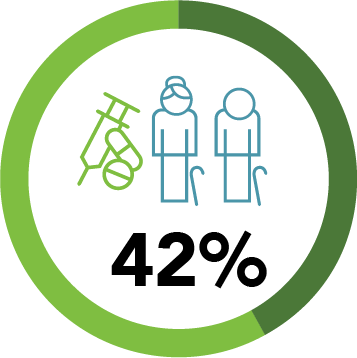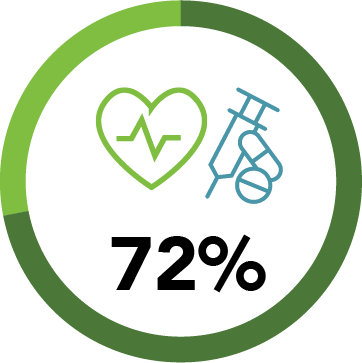Reduce adverse drug reactions, optimize therapeutic outcomes, and improve medication adherence
The right treatment for the right patient at the right time—that is the essence of precision medicine. This means that patients receive medications that are most likely to work for them in their unique situations.
For the most part, medication prescribing in primary care settings is empirical: Prescribers select medications based on guideline recommendations and their clinical experience. This one-size-fits-all approach may put some patients at unnecessary risk. Avoiding medication-based harm is vital for any patient, but the elderly are especially prone to several factors that may exacerbate overall risk—medical frailty, polypharmacy, and comorbid conditions.
The Sullivan Group, a medical education firm, lists several key considerations in elder care, including:1
- Complex, ambiguous, or atypical disease/symptom presentation
- Potential cognitive impairment
- Different “norms” for diagnostic tests
- Natural declines in cardiovascular, immune, and other system functions
- Polypharmacy
In the face of these potential complications, an individualized approach to care is essential. Applying pharmacogenomics to medication therapy helps address challenges like those listed above and allows clinicians to deliver the benefits of precision prescribing.
Pharmacogenomics enables precision prescribing

Pharmacogenomics (PGx) provides valuable information for a clinician regarding how a person’s genetic make-up affects their response to certain medications. The goal of incorporating this information into clinical practice is to give every prescriber the opportunity to get the desired response from their patients as soon as possible and with minimal side effects. PGx is a valuable tool for achieving that goal.
Medication challenges in an aging population
Older adults tend to have more chronic conditions and are medically frail compared to younger adults. In the U.S., they also tend to take multiple prescription medications—42% of Americans 65 and older take five or more prescription drugs, according to the Lown Institute.2 When a patient is on a cocktail of drugs to manage multiple conditions, the unwanted effects of the interactions among those drugs and the patient’s genetic make-up can be hard to characterize and mitigate.
In addition, the gradual decline in cardiac, renal, immune, and cognitive function common in the elderly can further complicate medication therapy. PGx testing can identify genetic variations that affect drug response to deliver better outcomes for patients living with these challenges.

Applying PGx in elder care

Careful PGx assessment can guide pharmacotherapy by predicting which drug—or combination of medicines—may deliver positive clinical outcomes while minimizing drug-gene and drug-drug-gene interactions. For example, 72% of cardiovascular drugs have confirmed drug-gene interactions, and there are actionable recommendations for optimal use of most of these drugs.3 One example of success is studies suggesting a strong benefit of PGx-guided therapy for the elderly in notoriously challenging fields like major depressive disorder.4
Key benefits of pharmacogenomic-guided therapy
Matching drug regimens—including dosing and timing—with patients’ PGx data delivers three broad benefits:
- Reduces adverse drug reactions including drug-gene and drug-drug-gene interactions
- Optimizes therapeutic outcomes by reducing trial-and-error prescribing
- Improves medication adherence by personalizing drug regimens, reducing discontinuation rate due to side effects
Precision medicine in general—and PGx in particular—will continue to advance and deliver ever-greater benefits for patients, particularly older patients who present with multiple comorbidities, polypharmacy, declining function, and medical frailty. In fact, someday soon, precision prescribing guided by PGx could be the norm, and every patient might have access to a tailored regimen that delivers optimal clinical outcomes.



